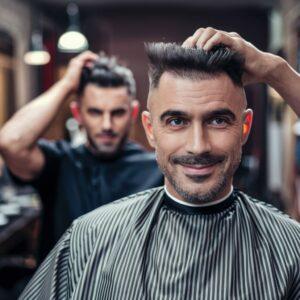Hair loss is an increasingly prevalent concern that affects many individuals as they reach their 40s, especially as part of natural aging processes. While for some it may come as no surprise, for others it can seem precocious and premature. Understanding why it occurs at this age will empower you to take proactive steps towards managing it more effectively. This comprehensive guide delves into its causes, offers practical solutions, and addresses frequently asked questions so you can successfully navigate this hairy situation.

Understanding Hair Loss at 40
Hair loss, medically known as alopecia, can occur due to various factors that may be genetic, hormonal, nutritional, or lifestyle-related. Here’s a closer look at why you might be experiencing hair loss at 40:
- Hormonal Changes: Hormones play an essential role. Men can experience a decrease in testosterone, which could impact hair growth; women may enter menopause, leading to estrogen and progesterone changes that impact hair health.
- Genetic Predisposition: Androgenetic Alopecia (pattern Baldness) is a hereditary condition that typically results in receding hairlines and crown thinning in men while overall thinning occurs among women.
- Nutritional Deficiencies: Lack of iron, zinc and vitamins B12 and D can contribute to hair loss; eating healthily is vital in order to preserve hair health
- Stress: Both physical and emotional stress may trigger telogen effluvium; when too much tension causes the hair to prematurely enter its resting phase and fall out prematurely.
- Medical Conditions: Thyroid disorders, autoimmune diseases and scalp infections can all lead to hair loss; medications prescribed for various medical conditions may also have this side effect as a side effect.
Lifestyle Changes to Limit Hair Loss
Detail lifestyle adjustments that can help mitigate hair loss:
- Diet: Emphasize the importance of eating a diet rich in essential vitamins and minerals that promote hair health.
- Exercise: Outline how regular physical activity can reduce stress and improve overall health, potentially impacting hair health positively.
- Stress Management: Offer strategies such as meditation, yoga, and sufficient sleep to manage stress effectively.
- Hair Care Practices: Suggest gentle hair care routines, avoiding harsh chemicals and treatments.
Medical Treatments:
Some medical treatments available to control hair loss are:
- Topical Treatments: Minoxidil can be applied topically to stimulate hair growth.
- Oral Medications: Finasteride for men, reducing hair loss by blocking DHT (a hormone linked to hair loss).
Popular Surgery/Therapies:
Hair Transplant and Low-Level Laser Therapy are 2 common therapies popular to treat hair-loss.
Hair Transplant Surgery:
Hair transplant surgery is a procedure where hair follicles are moved from one part of the body (the donor site) to bald or balding parts (the recipient site). Typically used to treat male pattern baldness, this surgery involves techniques like Follicular Unit Transplantation (FUT) and Follicular Unit Extraction (FUE). FUT involves removing a strip of skin with hair follicles from the back of the head, while FUE involves removing individual hair follicles. Both methods aim to restore hair growth in areas of the scalp with thinning or no hair.
Low-Level Laser Therapy (LLLT):
Low-Level Laser Therapy (LLLT) is a treatment that uses specific wavelengths of light to interact with tissue and is thought to help accelerate the hair growth process. It’s non-invasive, uses low-level lasers or light-emitting diodes (LEDs), and aims to stimulate cellular activity in the hair follicles to prevent hair loss and encourage growth. This therapy is often used for individuals experiencing pattern baldness and can be administered through devices like laser combs or helmets, designed for home use or professional settings.
Alternative Therapies:
Alternative therapies like acupuncture or aromatherapy, noting the limited evidence but potential benefits in reducing stress and promoting well being.
Acupuncture for Hair Loss:
Acupuncture, a traditional Chinese medicine technique, involves inserting thin needles into specific points on the body. It’s theorized to stimulate blood flow and distribute nutrients to the hair follicles, potentially reducing hair loss and promoting hair growth by balancing the body’s energy flow or Qi.
Aromatherapy for Hair Health:
Aromatherapy uses essential oils to improve physical and psychological well-being. For hair loss, oils like lavender, peppermint, and rosemary are believed to stimulate hair growth through scalp massage, enhancing blood circulation and potentially invigorating hair follicles.
Nutritional Supplements:
Supplements like biotin, iron, zinc, vitamin D, and omega-3 fatty acids play crucial roles in hair health. Biotin supports keratin production, potentially enhancing hair growth and strength. Iron helps red blood cells carry oxygen to hair follicles, essential for growth. Zinc promotes oil production in the scalp, keeping hair healthy. Vitamin D may help create new follicles. Omega-3s, found in fish oil, provide the oils that keep your scalp and hair hydrated, improving hair texture and preventing dryness.

Consultation with Specialists:
Dermatologists can offer personalized advice and treatments. In some cases, hair transplant surgery might be an option but in some cases oral/other treatments might be more suitable.
Home Remedies:
This is my top pick. Why, you might ask? Because this approach to combat hair loss and foster hair regrowth is entirely natural, free from side effects, and highly practical. We’ll explore several home remedies in this discussion, but I urge you to pay particular attention to the first one: yes, Onion Juice!

Onion Juice:
Onion juice is rich in sulfur, which helps in the regeneration of hair follicles, reduces hair thinning, and encourages new hair growth. It has antibacterial properties that help with scalp infections that can cause hair loss. Onion juice can be applied directly to the scalp and then rinsed off with a mild shampoo to promote healthier hair growth. Read this separate detailed article on this – How To Use Onion Juice For Hair Regrowth
Aloe Vera:
Aloe Vera is renowned for its soothing and moisturizing properties, making it an excellent remedy for promoting scalp health and hair growth. It helps in clearing dead skin cells that could clog hair follicles, reduces dandruff, and maintains the scalp’s pH balance. Aloe Vera gel can be applied directly to the scalp and hair, acting as a natural conditioner, and improving hair elasticity to prevent breakage.
Coconut Oil:
Coconut oil is rich in fatty acids that penetrate the hair shaft, providing moisture and reducing protein loss from the hair. It can be used as a pre-wash or post-wash treatment to protect hair from damage, moisturize the scalp, and promote healthier, thicker hair growth. Its antibacterial properties also help in keeping the scalp infection-free.
Rosemary Oil:
Rosemary oil is a popular essential oil known for its ability to stimulate hair growth and improve hair thickness. It enhances blood circulation to the scalp, which brings more nutrients to the hair follicles. Regular use of rosemary oil can also delay graying, prevent dandruff, and combat scalp dryness. It’s typically mixed with a carrier oil and massaged into the scalp and hair.
Fenugreek:
Fenugreek seeds are a powerhouse of nutrients beneficial for hair growth, including vitamins, iron, and proteins. They are known to promote hair growth, improve hair density, and combat scalp issues like dandruff. Fenugreek can be used by soaking the seeds overnight and creating a paste to apply to the scalp, or by using the water used for soaking as a hair rinse.
Takeaways:
Addressing hair loss effectively involves a combination of lifestyle changes, medical treatments, and, most importantly, consulting with healthcare professionals to determine the best course of action based on individual needs and conditions. Losing your hair at 40 can be a challenging experience, but understanding the potential causes is the first step towards addressing it. By exploring the reasons behind hair loss and implementing practical solutions, you can take charge of your hair health. Remember, you’re not alone in this journey, and help is available. Whether through lifestyle adjustments, nutritional supplements, or medical treatments, there are paths forward for those experiencing hair loss at this stage in life.
FAQs
Q: Is hair loss at 40 reversible?
Depending on the cause, hair loss can be reversible. Early intervention with lifestyle changes and medical treatments can significantly improve hair health.
Q: How can I tell if my hair loss is normal or a sign of something serious?
Losing 50-100 hairs a day is considered normal. If you’re losing more than that or noticing bald patches, it’s best to consult a healthcare professional.
Q: Can vitamins help with hair loss?
Yes, vitamins and supplements that support hair growth, such as biotin, vitamin D, and iron, can be beneficial, especially if you have a deficiency.
